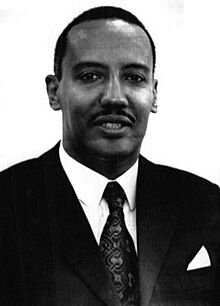Endelkachew Makonnen facts for kids
Quick facts for kids
Endelkachew Makonnen
|
|
|---|---|
 |
|
| Prime Minister of Ethiopia | |
| In office 1 March 1974 – 22 July 1974 |
|
| Monarch | Haile Selassie I |
| Preceded by | Aklilu Habte-Wold |
| Succeeded by | Mikael Imru |
| Personal details | |
| Born | 9 September 1927 |
| Died | 23 November 1974 (aged 47) |
| Political party | Independent |
| Alma mater | Oxford University |
Endelkachew Makonnen (born September 27, 1927 – died November 23, 1974) was an important Ethiopian politician. He was born in Addis Ababa, the capital city. His father, Makonnen Endelkachew, was also a Prime Minister of Ethiopia in the 1950s.
Endelkachew Makonnen belonged to a powerful family called the Addisge clan. This family had a lot of influence during the later years of the Ethiopian monarchy. He was the very last Prime Minister chosen by Emperor Haile Selassie. He was also the stepson of Princess Yeshashework Yilma, who was Emperor Haile Selassie's only niece.
| Top - 0-9 A B C D E F G H I J K L M N O P Q R S T U V W X Y Z |
Becoming Prime Minister
Endelkachew studied at Oxford University in England. He became Prime Minister of Ethiopia on February 28, 1974. He served in this role until July 22, 1974.
During this time, the government faced many challenges. Students and workers were protesting across the country. They wanted the government to investigate corruption. Corruption means misusing power or money for personal gain. They also asked for changes to land ownership rules. People also wanted more political freedoms.
Efforts to Bring Change
As Prime Minister, Endelkachew Makonnen tried to meet these demands. He suggested reforms that would change how the Ethiopian monarchy worked. The Emperor agreed to some of these ideas.
One big change was to write a new constitution. This new constitution would replace the old one from 1955. Another important idea was that the Prime Minister would answer to the elected Parliament. Before, the Prime Minister only answered to the Emperor. If this change happened, it would greatly reduce the Emperor's power.
These actions were meant to bring back order. They also aimed to make the government seem fair to the people. However, this was a very difficult time for Ethiopia.
Challenges from the Military
Endelkachew had support from older, well-known military leaders. But younger, more radical military groups did not support him. They started working against him as soon as he took office.
Some people believe Endelkachew tried to get help from moderate military officers. One such officer was Alem Zewde Tessema. He led the paratrooper battalion. Alem Zewde became the head of the Armed Forces Coordinated Committee (AFCC) on March 23.
A few days later, Alem Zewde ordered the arrest of 30 radical airmen. These airmen were at the Ethiopian Air Force base in Debre Zeyit. On April 30, Endelkachew tried to calm his opponents. He allowed the arrest of former ministers for corruption. These were his former colleagues from the Aklilu government.
Despite these efforts, radical ideas grew stronger. This happened among regular citizens and in the military. Alem Zewde lost his influence because he supported Endelkachew. On June 22, he lost control of his own soldiers. He then fled to Gojjam to find safety.
That same month, a new military committee was formed. It was made up of members from all military units. This new group became known as the Derg.
Arrest and End of Life
A key event that led to Endelkachew's downfall happened on June 26, 1974. Some conservative members of Parliament asked the Emperor to release officials jailed for corruption. Many people saw this as a sign. They thought the ruling politicians did not plan to punish these individuals.
The new military committee, the Derg, acted quickly. On June 30, they arrested 50 more people. These people were accused of being involved in corruption. Over the next two weeks, 150 more people were arrested. This included members of the government, nobles, and even the Emperor's grandson, Iskinder Desta.
Despite his efforts to stay in power, Prime Minister Endelkachew was arrested. This happened on July 22, 1974. The Derg then asked Mikael Imru to become the new Prime Minister.
In the following months, the Derg slowly took apart the government. On September 12, Emperor Haile Selassie was officially removed from power. This event was not a surprise, given everything that had happened since July.
Finally, on November 23, Endelkachew and 60 other former officials were taken from Menelik Palace. They were moved to Alem Bekagn prison. There, their lives were ended.
Earlier Career
Before becoming Prime Minister, Endelkachew held many important jobs. He worked in diplomacy and politics. He was Ethiopia's Ambassador to Britain. Later, he became Ethiopia's Permanent Representative to the United Nations.
In 1972, he was considered for the job of UN Secretary General. This is a very high position in the United Nations. However, Kurt Waldheim was chosen for the role instead. Endelkachew also served as the Minister for Posts and Communications. He was also the International President of the YMCA.
 | Dorothy Vaughan |
 | Charles Henry Turner |
 | Hildrus Poindexter |
 | Henry Cecil McBay |

